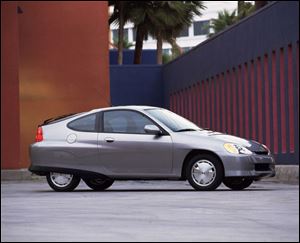
Hybrids make inroads, but concerns remain
7/15/2005
The list of hybrids has grown since the Honda Insight arrived in 1999.
John Saggese admittedly took a gamble when he bought a 2000 Honda Insight, since he didn't know whether batteries powering the $21,000 hybrid's electric motor would last.
Five years later, the Sylvania man has put 135,000 miles on the two-seat car going to California, Colorado, Wisconsin, and elsewhere, averaging 52.4 miles on a gallon of gasoline. And other than a pair of oxygen sensors, along with tires and other typical maintenance items, Mr. Saggese hasn't replaced any parts on the gasoline-electric hybrid, including the batteries.
For Mr. Saggese, the gamble clearly paid off.
"I've been very happy with it," said the business owner, who often travels for his project management company, Sagesse & Associates Inc. "It has worked very well for me."
The list of hybrid vehicles available in the United States has grown since the Insight was first to arrive in 1999, and talk of their gas-saving prowess has intrigued many consumers as pump prices continue to climb.
But, just like Mr. Saggese, who was skeptical initially, more than half of U.S. consumers are concerned about hybrids' limited battery-pack life. And 61 percent are worried about the difficulty and expense associated with repairing the technology, according to a Kelley Blue Book survey released yesterday.
Service and longevity issues top consumer concerns about existing hybrid models - including the Toyota Prius and versions of the Honda Civic, Honda Accord, Ford Escape, Toyota Highlander, and Mercury Mariner - but many believe issues will be resolved over time, the survey found. In fact, more than a third of consumers believe gas-electric hybrid engines will be the dominate powertrain in five to 10 years, according to the survey.
Still, 51 percent of consumers say they either need to know more about the technology or aren't interested in it at all, almost equally dividing proponents and skeptics, said Jack Nerad, editorial director and executive market analyst for Kelley Blue Book.
To be successful with hybrids, Mr. Nerad said, automakers will have to woo two large groups on both sides of the divide between proponents and skeptics: The 43 percent of consumers who say they are interested in the technology if it makes economic sense - costing no more than $2,355 on average above a comparable gas-powered vehicle - and the 35 percent who want to learn more.
Prospective customers at Jim White Toyota in Sylvania Township ask about hybrid battery life and how the technology works, but are satisfied once they get answers, said Dave Wittenmyer, general manager.
The dealership has a Prius, which costs $700 to $1,200 more than a similarly sized and equipped Toyota Camry, for customers to test drive. It has helped a lot, Mr. Wittenmyer said. A shortage of hybrid vehicles, not interested customers, has stifled sales at the dealership, he said.
Mathews Ford Inc. of Oregon has had the same problem with the hybrid version of the Escape, which costs about $3,200 more than its gas-powered sibling. With the Escape's technology, an electric motor takes over in low-speed traffic to save gas, so most are being sent to large urban areas on the coasts, said Tim Korhumel, the dealership's general sales manager.
"The ones that we've gotten have sold right away," he said.
Contact Julie M. McKinnon at:
jmckinnon@theblade.com
or 419-724-6087.